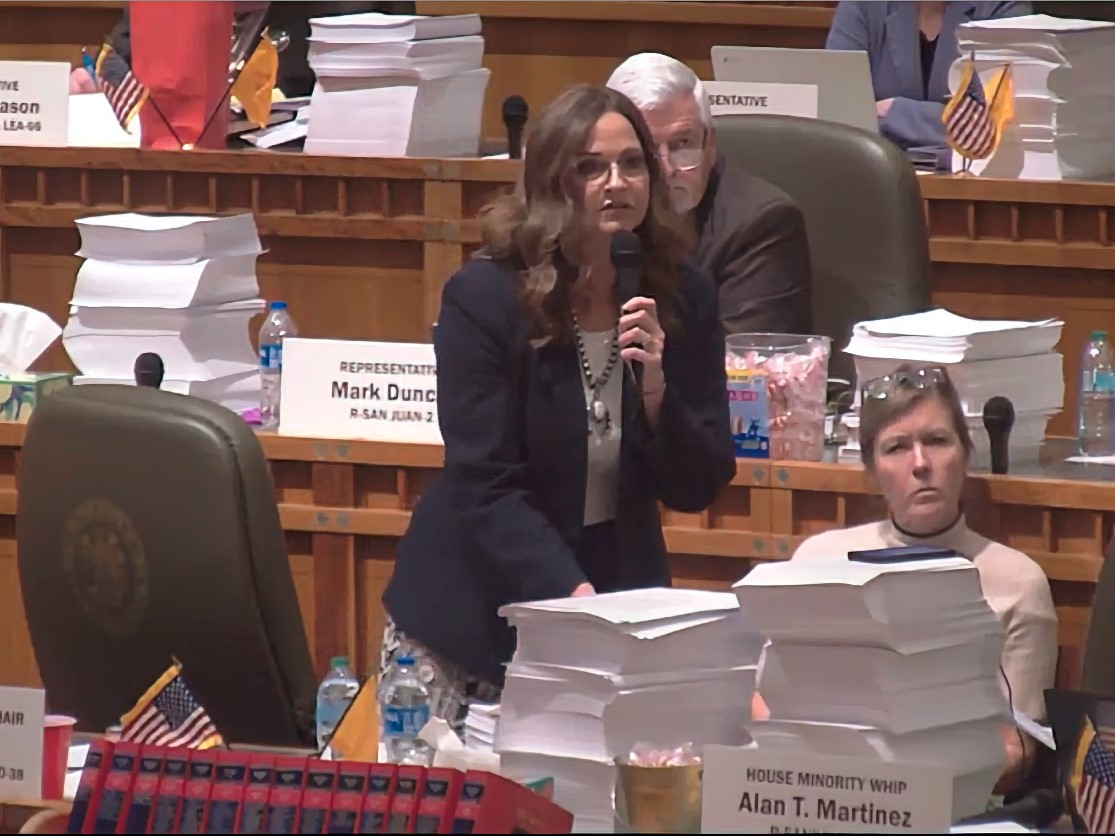DUELING BILLS – HOUSE PASSES PFML BILL,
AND A LOT OF RED INK, TO THE SENATE

Awash in red ink, the House chose to send a sweeping paid family and medical leave act (known now as the Family Wellness and Welcome Child Act) instead of a more limited and fiscally sound measure to the Senate on a vote of 38-31. House Bill 11, sponsored by Reps. Christine Chandler (D-Los Alamos, Sandoval & Santa Fe) and Linda Serrato (D-Santa Fe) provides six weeks of paid medical leave, funded by new payroll taxes on employees and employers. The measure also provides 12 weeks unpaid leave for childbirth, adoption or fostering plus $9,000 cash to the parent or parents.
Rep. Rebecca Dow (R-Doña Ana, Sierra & Socorro) presented a floor substitute that instead offered six weeks of paid leave plus an optional three weeks (paid for voluntarily by the employee) for childbirth, adoption or fostering. The concept behind the floor substitute is to craft a much more limited program that can be paid for out of existing state revenues, possibly the Early Childhood Trust Fund, requiring no tax increases (or the Legislature can choose to fund the program with other resources). The estimated cost is $19 million. By way of comparison, the Early Childhood Trust fund currently provides $250 million to the Early Childhood Education and Care Department annually, which the department is seeking to increase to $500 million. Obviously, $19 million is a drop in the bucket but perfectly aligns with the mission of the ECEC department, which is to provide services from prenatal to kindergarten. By the way, Dow is one heck of a good debater!

The Welcome Child portion of HB 11 costs $193 million per year, escalated each year by a cost of living adjustment. There is no specified fund to pay for these costs, so the Legislature will have to decide later how to cover them, an unusual situation. Regarding the Family Wellness portion of the bill, in 2029 (the first year after full implementation of the program) the deficit ranges from $42.4 million growing to $227 million by 2031 in the “medium” scenario. Under the “high scenario,” the deficit in 2029 is $350 million, growing to $870 million in 2031. Only under the “low” scenario does the fund remain in the black.
The scenarios are based on different assumptions about how many people will participate – high, medium and low amounts. According to the fiscal impact report, “If enacted, New Mexico would be the lowest-income state to implement a PFML program. The lower payroll base could result in the payroll contribution being insufficient to cover the needs of the fund.” Here’s what would happen to payroll taxes. If the high scenario plays out, the tax would go from .2% to .8%, quadrupling the tax rate. If the medium scenario plays out, the rate would go to .5%, two and a half times the original rate. Even under the low scenario, the rate goes to .3%. Also, there’s an annual cap of .1% cap on tax increases. So, if raising the tax rate won’t cover the costs and keep the fund solvent, then the Legislature would have to bail the fund out. Payroll taxes can’t be raised until 2030, so any deficits in 2028 or 2029 would require the Legislature to pony up the bucks, and that’s a lot of ponying!
Chandler insists that a shortfall “is never going to happen” and disagrees with these calculations based on other states’ experiences. She says before the program goes into effect there will be an actuarial analysis performed. Given that this legislation has been under consideration for at least two years, Rep. Luis Terrazas (R-Catron, Grant & Hidalgo) questioned why an actuarial analysis hasn’t already been done so solid numbers could be examined. Terrazas also said he liked Dow’s proposal because “it lets us get our toes in the water rather than going head-first.” In response to a question from Rep. John Block (R-Otero), Dow revealed that sick leave and other benefits could be stacked against the weeks of leave, bringing it easily up to nine to 12 weeks if a person opts in to the voluntary, employee-paid three week supplement.
We’ve fought long and hard against this business- and job-killing legislation, and we’re not about to give up now. We’ll let you know how the battle goes over on the Senate side.
COMPLETE THE ECONOMIC DEVELOPMENT PUZZLE
– SITES READY FOR BUILDING

Imagine this conversation: U.S. Megacorp Inc. to New Mexico economic developer, “Hi, I’d like to build a plant here. I’m willing to invest a gazillion dollars, and we’ll bring 5,000 jobs. What sites do you have ready to go?” New Mexico economic developer, “Uh, well, let’s see…we could have one ready in two or three years.”
Senate Bill 169, sponsored by Sen. Michael Padilla (D-Bernalillo), would ensure that conversation never happens. The bill would establish a $24 million fund under the auspices of the Economic Development Department to find and select sites that are prime candidates to become shovel-ready for development. Sites from around the state are eligible for consideration. The sites could be publicly or privately owned and would be selected with the help of a diverse advisory committee.
J. D. Bullington testified in favor of the measure on behalf of the Chamber:
“SB 169 is all about increasing the number of sites ready for business development and reducing the amount of time businesses must wait for their site to be ready for building.
“Right now we have very little inventory for medium- to large-scale commercial, industrial or other uses. And these sites can take anywhere from two to four years or longer to prepare utilities and be ‘ready’ for development.
“Rather than risk asking the next Netflix or Amazon if they can wait a few years, SB 169 proactively allows New Mexico to create an inventory of strategic economic development sites around the state that will make New Mexico more competitive with other states and attract significant capital investment, tax revenues and jobs.”
Also in support are NAIOP, the N.M. Chamber, N.M. Idea, PNM and the Albuquerque Regional Economic Alliance, which stated that site readiness is a top issue for states across the country. It’s estimated that New Mexico is losing 30% or more of prospects because of the lack of building sites. Thirty-six states already have such a program.
Selected sites could be eligible for predevelopment funding, including engineering, site preparation, environmental remediation and housing studies. Predevelopment funding could also include loans or grants for infrastructure extensions such as roadways and utilities.
SB 169 and companion measure SB 170 are very much top priorities for all of us interested in economic development. We’ll report on the bill’s progress. Its next stop is the Senate floor.
ANTI-HAZING BILL IS MOVING FORWARD

The Senate Education Committee gave a “do-pass” recommendation to Senate Bill 148, sponsored by Sen. Antonio “Moe” Maestas (D-Bernalillo), that puts teeth into laws to stop hazing. The vote was 4-3, and the bill travels to the Senate Judiciary Committee next. J.D. Bullington was on hand to explain the Chamber’s position:
“I think we could change the title of this bill to ‘Lowering the Boom on Hazing.” And, in our view, the time has more than come. In a sense, organizations that employ hazing, especially that leads to great trauma and/or physical harm, are engaging in gang violence. And that needs to be dealt with harshly.
“SB 148 does that through a series of increasing penalties and requiring incidents of hazing to be reported. Moreover, it requires our institutions of higher learning to include prohibitions against hazing in their codes of conduct and communicate hazing policies. Finally, the bill would allow a person subjected to hazing to engage in a civil action for either injury or damages resulting from the hazing. These are all sensible requirements, and we urge you to vote ‘yes’ on SB 148.”
Also appearing in support were the secretary of Higher Education; University of New Mexico student activity center representatives; Jacqueline Vigil, a mother whose son committed suicide as a result of hazing; and William Benjamin, whose son was hazed during the New Mexico State University basketball incident. Appearing in opposition were the Law Office of the Public Defender and the ACLU, which routinely oppose criminal penalties. Some members of the committee also subscribe to the “penalties don’t change behavior” school. Don’t know about you, but getting grounded by our parents or not getting our allowance certainly caused a behavioral change in a lot of us.
Maestas and his expert witness, Sean Sullivan with the Department of Justice, displayed a deep knowledge of the issue and how to best tackle the problem. This bill mirrors national best practices and would place New Mexico among the vast majority of states that have similar laws. Right now, New Mexico is one of only six states that doesn’t have a law. The bill now moves to the Senate Judiciary Committee. We’ll keep you posted on its progress.
BILL TARGETS SWATTING, WHICH THREATENS
OUR STUDENTS AND OUR COMMUNITIES

Senate Bill 18, introduced by Sen. Craig Brandt, defines and criminalizes swatting, which is knowingly making a false or misleading report of an ongoing emergency or threat of violence to a public safety agency, agency personnel, or to a public safety answering point, with the intent to cause an immediate response from law enforcement and other first responders. This act is classified as a fourth-degree felony under the bill.
The term “swatting” comes from sending a SWAT team to investigate the alleged incident, which is often to harass a neighbor or interrupt a school day. This bill puts swatting on the same plane as making a shooting or bomb threat. The Senate Judiciary Committee gave a unanimous 8-0 “do-pass” recommendation.
Terri Cole, president and CEO of the Chamber, sent the following letter of support to the committee today:
February 28, 2025
Honorable Senate Judiciary Committee Members:
On behalf of the Greater Albuquerque Chamber of Commerce, I want to register our strong support for SB 18.
Nothing is more terrifying to a student than to be threatened with violence, especially our youngest and most vulnerable. Swatting is a form of violence and intimidation that can leave lasting emotional scars. For those that commit such crimes, a slap-on-the-wrist misdemeanor is not nearly enough of a consequence for perpetrating violence. SB 18 would bring a meaningful consequence by making swatting a felony. It’s what we should do for our children.
According to an analysis by TDR Technology Solutions, the impact of swatting nationwide is tremendous:
- Impact on Schools: Over 2,000 schools experienced swatting incidents in September 2024 alone, leaving students traumatized and disrupting education nationwide.
- Taxpayer Burden: The annual cost of swatting to taxpayers has soared to $500 million, driven by school disruptions, lost instructional time and mental health impacts – excluding the costs incurred by emergency response and first responders.
Every fake threat diverts resources away from genuine emergencies, putting entire communities at risk. The toll on mental health, especially for students, is immeasurable. These children should feel safe in their schools, not terrified by hoaxes designed to cause chaos.
As you can see, this is a big problem, and a growing problem. SB 18 is an important tool that can help. We urge your support of SB 18. Please vote “yes.” Thank you for considering our input.
Sincerely,
Terri Cole, president and CEO
Greater Albuquerque Chamber of Commerce.
There was no support nor opposition to the measure mentioned in the meeting. Brandt has diligently worked on this measure for years, and it’s great to see the bill finally move forward. It will next be considered by the Senate Finance Committee. Let’s hope this is the year SB 18 sees the top of the governor’s desk.
MAKE CLASSROOMS A NO-CELL-PHONE ZONE

The iPhone was first released 17 years ago, on June 29, 2007. The Android phone was introduced just a year later. That means that every single student in school today has never known a world where we don’t have instant access to texts, Instagram or a camera.
But the ubiquitous cell phone has become a major problem in classrooms throughout the country. Nearly 30 states have already implemented some type of policy to curtail the distractions that cell phones pose during instructional time. Today Sen. Crystal Brantley (R-Catron, Doña Ana, Grant, Hidalgo, Luna, Sierra and Socorro), presented Senate Bill 11 to the Senate Finance Committee, which approved the measure on a 9-0 vote, sending it to the Senate floor. This bill was combined with a similar bill sponsored by Sen. Moe Maestas (D-Bernalillo) so there is one approach moving forward.
Brantley hopes to obtain funding in this year’s budget so the Public Education Department (PED) can reimburse local school districts that voluntarily implement anti-distraction programs that include the use of specialized pouches that educators can “lock” during instruction time. The pouches, which cost about $30 each, provide for emergency access to the phones if necessary. If all 300,000 students statewide receive pouches, it would cost $10 million; however, a pilot program for $1 million or $2 million would be a good start. Development of policies is left to local school districts but must meet minimum requirements prescribed by PED.
The Chamber’s lobbyist, J.D. Bullington, stood in support of the bill:
“The Chamber advocates for policies that support teachers, raise student academic performance and support healthy social development of our students. We support this bill because it will align with all those policies that we believe will improve our education system.
“Indeed, we think curtailing cell-phone use in the classroom will help students focus on the blackboard, not on a circuit board. Studies and anecdotal evidence show that classroom cell phone bans lead to better test scores, improved mental health and the improved development of social skills.”
Also joining in support were the New Mexico Superintendents Association, the New Mexico School Boards Association, PED, New MexicoKidsCan and the American Federation of Teachers. The teacher’s union reported this is the No. 1 issue that teachers complain about and want help with. The representative pointed to the Taos school district as a pioneer in this area.
Former U.S. Education Secretary Miguel Cardona has observed:
“In one study, some 16-year-old students saw their test scores increase after schools banned phones, with most of this change driven by the most disadvantaged and lower-performing students. Another study showed 10.6%t lower test scores among students who retained their cell phones compared to student groups not interrupted by text messages. A study focusing on girls shows that removing cell phones led to higher grades and an increased likelihood of attending an academic high school. Some parents and students who initially are less supportive of limits support them after seeing the benefits and having a voice in the schools’ approach.”
We’ll let you know how this develops. Check your phone for updates!
HOUSE JUDICIARY NARROWLY ADVANCES MISGUIDED
NURSE-TO-PATIENT RATIOS

On Wednesday afternoon, the House Judiciary Committee picked up where it left off on Wednesday with House Bill 72.
The bill, Nursing Staff-To-Patient Ratios, sponsored by Rep. Eleanor Chávez (D-Bernalillo), had public comment Wednesday and was back in the committee for discussion.
The bill directs the Health Care Authority to develop rules to create and enforce minimum nurse-to-patient staffing ratios for hospitals. The authority is authorized to waive staffing requirements for rural general acute care hospitals, while certain exceptions to the staffing ratios are granted. It would also create the staffing advisory committee.
On Wednesday, Chávez presented a committee substitute with definitions to what critical care is, as well as what defines rural. The substitute also includes a committee called the Hospital Network Committee that would be established by each hospital across their network.
Joining the Chamber in opposition were the Gallup-McKinley Chamber of Commerce, Christus Health System, New Mexico Hospital Association, San Juan Regional Medical Center, New Mexico Chamber of Commerce, University of New Mexico Hospital and Sierra Vista Hospital.
Our opposition is based on the severe nursing shortages in the state, which make staffing ratios impractical. The net result is likely to be fewer beds available, not improved care.
With an updated committee substitute on the table, Speaker of the House Rep. Javier Martínez (D-Bernalillo) made a motion for a “do-pass” vote. The motion passed on a vote of 5-4. The bill will now head to the House floor.
HOUSE JUDICIARY GIVES ‘DO-PASS’ TO BILL
THAT LIMITS OIL AND GAS NIMBLENESS

Earlier this evening, the House Judiciary Committee heard House Bill 258 as amended, Natural Gas Venting, Flaring Capture Requirement, sponsored by Rep. Matthew McQueen (D-Sandoval & Santa Fe).
The bill creates new gas-capture requirements for natural gas well operators but provides significant exemptions.
An amendment was made prior to getting to House Judiciary. The amendment included that beginning Jan. 1, 2027, an operator shall ensure at least 98% of the natural gas produced or gathered by the operator’s facilities is captured in a calendar year; provided that natural gas shall not be included in the determination of an operator’s overall capture percentage if that gas is:
- Released during an emergency,
- Beneficially used by the operator,
- Not suitable for transportation or processing due to nitrogen, hydrogen sulfide or carbon dioxide concentrations.
McQueen said what the bill does is put into statute the core element of the state’s existing methane-capture rules. “We already have the rules, and this bill puts them into statute. It doesn’t seek to change the rules in any way,” he said.
Adrian Gomez, SVP of Policy and Programs of the Greater Albuquerque Chamber of Commerce, testified in opposition to the bill:
“As we read the legislation, this bill codifies what’s pretty much in OCD rules already. Chiseling those rules into statute reduces the ability to adapt to changing technology and operating conditions. The industry has been very successful at capturing natural gas, and we have every reason to believe that innovation will continue, as it improves profitability.
“This seems to us to be a solution in search of a problem and potentially puts a heavy regulatory thumb on the scales that should balance regulation versus innovation. This bill’s purpose appears to be more of a way to protect existing rules against the possibility of changes by a future administration than it does solving an obvious problem. We urge a ‘no’ vote on HB 258.”
Joining the Chamber in opposition were the New Mexico Oil and Gas Association, Permian Basin Petroleum Association and the Independent Petroleum Association of New Mexico.
A motion was made for a “do-pass” vote, which was approved 7-3. The bill now heads to the House floor.
WITH NO OPPOSITION, DENTIST/ DENTAL HYGIENIST
COMPACT GETS A ‘DO-PASS’

On Thursday morning, the House Health and Human Services Committee heard House Bill 441, Dentist and Dental Hygienist Interstate Compact, sponsored by Rep. Gail Armstrong (R-Catron, Sierra, Socorro & Valencia).
The bill enters New Mexico into the Dentist and Dental Hygienist Interstate Compact in order to allow out-of-state dentists and hygienists to practice here to improve public access to dental services. The Dental and Dental Hygienist Compact Commission would serve as the national administrative body.
Adrian Gomez, SVP of policy and programs for the Greater Albuquerque Chamber of Commerce, testified in support of the bill, saying:
“The Health Care Authority says HB 441 may help increase the number of dentists and dental hygienists available to patients with Medicaid in New Mexico, improving access to care, especially in underserved areas. This helps make New Mexico competitive.
“The compact ensures that dentists and dental hygienists meet consistent licensure standards across participating states, which could lead to improved quality of care.
“The Chamber is pleased to support this bill as it aims to bring more care to New Mexicans, and we ask you to vote to pass it.”
Also testifying in support of the bill were the New Mexico Dental Association, New Mexico Dental Hygienist Association, Choice Health Care Services and New Mexico Board of Nursing.
There was no opposition.
The committee voted 9-0 for a “do pass.”. The bill moves on to the House Judiciary Committee.
SIGNING OFF FROM SANTA FE

Ah…the weekend…for the Legislature, not so much. There will be committee and floor sessions in both chambers tomorrow, and at least one committee meeting on Sunday. Ouch. Of high importance tomorrow is a bill sponsored by Sen. Craig Brandt (R-Sandoval) that would expand the number of crimes covered by the state racketeering law. This would be a terrific tool for prosecutors to use against organized crime and gangs engaged in fentanyl (and other drug) trafficking, selling of stolen weapons, human trafficking and sexual exploitation. As former Gov. Bruce King probably would have said, “Have a mighty fine weekend.” Thanks for joining us, and we’ll be back with you soon.



